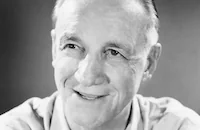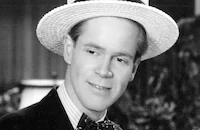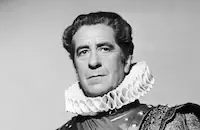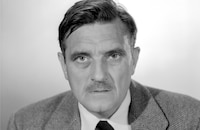Silver Lode
Brief Synopsis
Cast & Crew
Allan Dwan
John Payne
Lizabeth Scott
Dan Duryea
Dolores Moran
Emile Meyer
Film Details
Technical Specs

Synopsis
In Silver Lode, as Fourth of July celebrations get underway, four men--leader Fred McCarty, Johnson, Kirk and Wicker--ride into town, demanding to know the whereabouts of Dan Ballard. The men are directed to the home of wealthy Zachary Evans, whose daughter Rose is about to marry Dan, a local rancher. After interrupting the ceremony, McCarty identifies himself as a U.S. Marshal and accuses Dan of shooting McCarty's brother in the back two years before and stealing $20,000 from him. Although Dan claims that McCarty is a rustler and killer, McCarty produces papers certifying his own position, along with an arrest warrant for Dan. Sure that Dan soon will be exonerated, Rose and Zach insist on continuing with the wedding, but Dan demurs. Thad Taylor, Dan's lawyer, then offers to take McCarty's paperwork to Judge Cranston, but after he leaves, McCarty demands that Dan prepare to ride to California, where the killing took place. To the annoyance of McCarty, all of the wedding guests accompany Dan to his house and attest to his integrity. In his stable, Dan admits to Rose that he did kill McCarty's brother but did so in self-defense. Meanwhile, concerned that McCarty might kill Dan in revenge, Sheriff Woolley forms a posse, which includes Rose's brother Mitch, to escort McCarty and his deputies. Surrounded by unhappy townspeople, McCarty goes to Cranston's house to discuss Dan's situation, and although the judge is sympathetic to Dan, he upholds McCarty's extradition request. Dan then begs McCarty for two hours to explain himself to the town, and McCarty, anxious to appear reasonable, agrees. Dan's first task is to send two telegrams to sheriffs in California, asking them to confirm McCarty's identity, but Paul Herbert, the telegrapher, discovers that the wires are down and rides off to repair them. Dan next goes to the saloon and begs Dolly, a dance hall girl and former lover, to use her charms to obtain information about McCarty's deputies. Dolly, who is jealous of Rose, refuses to help, so Dan approaches the men himself, offering them $1,000 to expose McCarty. Johnson takes the bait and, meeting secretly with Dan in the courthouse, demands $5,000 to implicate McCarty. Dan heads to the Evanses' and asks Zach for the cash, which Zach happily gives. Mitch then helps Dan elude McCarty and Kirk and rushes back to the saloon to find Johnson. While Dan and Johnson slip away to the livery stable, Dolly, who has had a change of heart, distracts Wicker. Dan, however, discovers where Dan and Johnson are and sneaks into the stable through the loft. After Johnson tells Dan that McCarty had his marshal papers forged, killed the forger and cut the telegraph wires, McCarty reveals himself and shoots Johnson. Now alone with Dan, McCarty offers to end his pursuit if Dan pays him the $20,000 he won from his brother in a poker game. Unknown to McCarty, Sheriff Woolley has also entered through the loft and overhears McCarty. Woolley and McCarty exchange gunfire, but while McCarty is barely wounded, Woolley dies. When Cranston and the Evanses show up, Dan has two guns trained on McCarty, who accuses Dan of murdering Woolley and Johnson. As Rose is now his only defender, Dan tries to flee town but runs into the returning telegrapher. After Dan begs Paul to send the telegrams, Wicker, Kirk and Mitch catch up to him, and Dan ends up killing the deputies and wounding Mitch. Dan then sneaks into Dolly's room in the saloon, and she hides him when McCarty comes looking for him. Desperate, McCarty deputizes all the townsmen and begins a house-by-house search. Dan escapes to the Evanses' and instructs Rose to make sure Paul sends the telegrams. Zach finds the two together, however, and shoots Dan when he tries to leave. Only wounded, Dan overwhelms the older man and, just as McCarty bursts in, flees once more. Dan then takes Cranston hostage and fights off McCarty long enough to seek refuge in the church. Although McCarty bursts into the church demanding that Rev. Field turn Dan over, Field refuses to help. Rose and Dolly, meanwhile, join forces at the telegraph office and cajole Paul, who sent Dan's wires but has not yet received a reply, to write a phony return telegram, implicating McCarty as a criminal. Rose runs to the church with the fake reply, just as McCarty corners Dan in the bell tower and begins firing on him. The telegram exonerates Dan, and McCarty is killed when one of his bullets richochets off a bell and pierces his heart. In the telegraph office, Dolly then learns that a real telegram has been received, and Dan's innocence is confirmed.

Director

Allan Dwan
Cast

John Payne

Lizabeth Scott

Dan Duryea

Dolores Moran
Emile Meyer

Robert Warwick
John Hudson

Harry Carey Jr.

Alan Hale Jr.
Stuart M. Whitman
Frank Sully

Morris Ankrum
Hugh Sanders
Florence Auer

Roy Gordon
Edgar Barrier
Joe Devlin
Leo Gordon

Byron Foulger
Ralph Sanford
Myron Healey
Charles Evans
Burt Mustin
Gene Roth
John Dierkes
Crew
John Alton
Benedict Bogeaus
Benedict Bogeaus
Leon Chooluck
Karen Dewolf
Louis Forbes
James Leicester
Lee Lukather
Van Nest Polglase
Ralph J. Slosser
Charles Thompson
Gwen Wakeling

Film Details
Technical Specs

Articles
A TALE OF MOB JUSTICE ON THE RANGE - Silver Lode on DVD
Now available on DVD from Image Entertainment, Silver Lode has often been cited by director Martin Scorsese as one of his favorite Westerns and he comments on it in A Personal Journey With Martin Scorsese Through American Movies (co-written with Michael Henry Wilson): "Dwan's finest movies featured simple people, pastoral landscapes and the rural America of a bygone era. Yet behind the lyrical images of the old West, Silver Lode suggests the fragility of our democratic institutions. On the day of his wedding, John Payne should be the happiest man in Silver Lode. Instead, he has to fight for his life when he is unjustly accused of a murder and ostracized by the community. Daringly, the fugitive's bride-to-be convinces the town that he is not guilty by forging a federal warrant. A church bell and a fantastic fraud save the day. Persecuted for the wrong reasons, Payne is pardoned for the wrong reasons. This was the era of the blacklists; political messages had to be smuggled in - cloaked in metaphors. Actually, the name of the villain played by Dan Duryea was McCarthy."
Of course, not everyone will agree with Scorsese's high opinion of the film which has its share of flaws including some inane dialogue, uneven performances, and preposterous plot contrivances. It definitely comes up short when compared to High Noon (1952), an A-budget Western starring Gary Cooper which was made two years earlier and was also seen as anti-McCarthy morality play. It also can't quite match the entertaining flamboyance of Johnny Guitar (1954), which was released the same year as Silver Lode but was an even more extreme presentation of frontier justice that drew parallels with the political hysteria of its day. On the plus side, though, Silver Lode is tautly directed by Dwan who doesn't waste a shot and moves the narrative along at a brisk clip. John Payne, an often underrated actor whose best work was in film noirs, is also impressive as the accused hero. The way he plays the part you're never quite sure until the end whether or not he really is guilty as charged. His refusal to explain himself adequately to the townspeople underscores his oddly ambiguous behavior while providing the film with an added layer of suspense.
VCI's DVD of Silver Lode is presented full frame (4X3) and comes with a few standard extras - the theatrical trailer, actor biographies and a choice of scene selections. The original source materials used for the transfer look relatively clean but the Technicolor is now just a faded memory of the original with bleached out hues of yellow, red, blue and orange battling for dominance from scene to scene. Until someone comes along and performs a full-scale restoration on this film, however, the VCI disk is probably the best available version of Silver Lode you're going to see.
VCI is also offering another Allan Dwan on DVD - Passion (1954), presented full screen (4X3). Stylistically closer to a costume drama than a Western, the film is set in California in the 1800's and centers around a rancher (Cornel Wilde) who is seeking revenge for his wife's murder. Yvonne De Carlo plays dual roles, one as the rancher's ill-fated wife, the other as her identical sister who wants justice for her sibling. Filmed on location in the mountains between California and Nevada, Passion features the cinematography of John Alton who also photographed Silver Lode. In the Peter Bogdanovich biography, Allan Dwan: The Last Pioneer, the director admitted that "I didn't think much of the story - it was a contrived affair, but the shooting was one of our shrewd business manipulations. We rented magnificent Spanish sets Warner Bros. had built for some big picture, and then we moved over to Universal and used a lot of their sets. So we got a magnificent production for very little money." Yes, Passion could almost pass for an A-picture on looks alone but just about everything else about it is unremarkable. Admirers of Dwan's work and Western B-movie completists might want to take a look at it but Silver Lode is easily superior to this feature. And like VCI's presentation of the latter, this DVD also comes with the theatrical trailer, actor biographies and a choice of scene selections. Once again, the transfer was made from a faded color print so you'll have to use your imagination and try to picture the dazzling Technicolor imagery of the original.
For more information about Silver Lode and Passion or to purchase them, visit VCI Entertainment.
By Jeff Stafford

A TALE OF MOB JUSTICE ON THE RANGE - Silver Lode on DVD
Quotes
Trivia
Notes
The working titles of this film were Desperate Men and Four Desperate Men. According to a December 1953 Hollywood Reporter news item, Silver Lode was to be shot in a "new anamorphic process known as ScenicScope." Although the Daily Variety review lists an aspect ratio of 1.85:1 and Hollywood Reporter production charts list ScenicScope as the process used during filming, ScenicScope is not credited onscreen. The December 1953 Hollywood Reporter news item also notes that the picture would be shot in Ansco Color, but Eastman Color is cited in production charts and no color process is listed on the film itself. Dolores Moran, who plays "Dolly" in the film, was married to producer Benedict Bogeaus at the time of production. Modern sources include Paul Birch in the cast.














